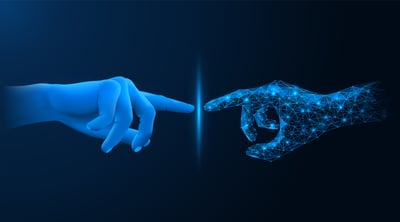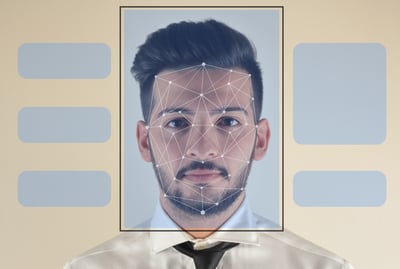July 25, 2025
 by Katam Raju Gangarapu / July 25, 2025
by Katam Raju Gangarapu / July 25, 2025

You unlock your phone using Face ID. A traffic cop identifies a suspect with real-time surveillance footage. Retailers use it to track in-store customer behavior. These aren’t scenes from a sci-fi movie. It’s just another Tuesday in the age of facial recognition, powered by image recognition technology.
But behind this seamless convenience lies a complex web of ethical concerns: racial bias in algorithmic accuracy, surveillance overreach, lack of transparency, and troubling questions about consent.
As this technology embeds itself deeper into daily life, it’s evolving faster than the laws meant to govern it. From identity fraud to racial bias and mass surveillance, the ethical red flags are impossible to ignore.
The questions around the ethics of facial recognition are coming under fire.
The ethical issues of facial recognition include privacy violations, racial and gender bias, mass surveillance, and lack of consent. These systems can misidentify individuals, disproportionately affect marginalized groups, and enable government overreach without transparency or accountability.
The consequences of deploying facial recognition systems at scale are far from simple. These systems don’t just raise technical challenges; they introduce real-world risks that demand clear policy frameworks and legal oversight.
In this article, we’ll explore the ethical flashpoints of facial recognition, spotlight responsible use cases, and share key recommendations for more equitable and accountable deployment.
In recent years, critics have questioned facial recognition systems’ accuracy and role in identity fraud. In several cases, law enforcement agencies mistakenly implicated innocent people in riots. Additionally, identity management and storage remain questionable for many, haunting privacy advocates worldwide. It seems complicated, doesn't it?
| Ethical concern | Real-world impact | Suggested mitigation |
| Racial bias and discrimination | Misidentification of people of color, wrongful arrests, systemic inequality | Train models on diverse datasets; conduct independent audits; mandate bias testing |
| Data privacy | Unauthorized data collection, surveillance, and misuse of sensitive biometric data | Enforce opt-in consent, minimize data collection, and strengthen storage protections |
| Lack of informed consent and transparency | Use of facial data without user awareness or permission | Standardize consent processes, regulate dataset sourcing, and ensure disclosure policies |
| Mass surveillance | Loss of anonymity, chilling effects on expression, unchecked state monitoring | Restrict public deployment, require oversight, and enact legal safeguards |
| Data breaches | Identity theft, data leaks, and limited recourse for affected individuals | Encrypt facial data, enforce breach disclosure, and establish stronger biometric laws |
Let's examine each of them in detail.
Despite advancements in facial recognition technology, racial bias remains one of its most persistent and damaging flaws, especially in law enforcement contexts. Although facial recognition algorithms ensure classification accuracy of over 90%, these results are not universal.
More than half of American adults, or nearly 117 million people, have photos on law enforcement's facial recognition network. However, it’s disturbing that errors detected in the face recognition system were more common on dark-skinned faces, but fewer errors were made when matching light-skinned faces.
In July 2020, the National Institute of Standards and Technology (NIST) conducted independent assessments to confirm these results. It reported that facial recognition technologies for 189 algorithms showed racial bias toward women of color. NIST also concluded that even the best facial recognition algorithms studied couldn’t correctly identify a mask-wearing person nearly 50% of the time.
The problem worsens in law enforcement. In a recent revelation, the United States Federal government released a report that confirmed discrimination issues in its facial recognition algorithms. Its system usually worked effectively for the faces of middle-aged white males but poorly for people of color, the elderly, women, and children. These racially biased, error-prone algorithms can wreak havoc, including wrongful arrests, lengthy incarcerations, and even deadly police violence.
of facial recognition errors happen when identifying women of color, compared to 1% for white males.
Law enforcement agencies like the United States Capitol Police rely on mugshot databases to identify individuals using facial recognition algorithms. This leads to a feed-forward loop, where racist policing strategies result in disproportionate and innocent arrests.
Overall, facial recognition data is imperfect. It could result in penalties for crimes not committed. For example, a slight change in camera angle or appearance, such as a new hairstyle, can lead to errors.
Privacy remains one of the public’s most pressing concerns regarding facial recognition, primarily due to the lack of transparency around how facial data is collected, stored, and used. These systems often operate without informed consent, enabling constant surveillance and the capture of facial images without individuals’ knowledge.
In 2020, the European Commission banned facial recognition technology in public spaces for up to five years to make changes to their legal framework and include guidelines on privacy and ethical abuse.
A major risk lies in unsecured data storage. Many organizations still store facial recognition data on local servers, which are vulnerable to breaches, especially in the absence of skilled IT security professionals. Even when collected for a legitimate purpose, such as workplace or public safety, this data can be repurposed or shared without the subject’s awareness, raising the specter of function creep.
Facial recognition also presents a unique threat: facial scans can be collected remotely, in real time, and often without consent, making them especially vulnerable to silent misuse. The potential for abuse is amplified by the fact that facial data is permanent and identifiable, unlike passwords or tokens that can be changed.
While cloud-based storage can offer stronger security through encryption, true data integrity demands more: strict access controls, robust cybersecurity practices, and end-user control over how their data is stored and shared.
In the consumer space, facial recognition is seen as less invasive, largely because users can disable or opt out of the feature on their devices. Still, companies using facial recognition in consumer products have faced backlash and legal scrutiny. In one landmark case, Facebook settled a $650 million class-action lawsuit in Illinois over collecting photos not publicly available for facial recognition.
Meanwhile, privacy concerns remain particularly acute in the public sector. Law enforcement agencies continue to use facial recognition to scan, monitor, and track individuals without their knowledge or consent, all in the name of public safety. This has led to growing public protests and calls for stricter regulation, demanding more transparency, citizen control, and legal accountability around data use and governance.
Privacy is an issue with any form of data mining, especially online, where most collected information is anonymized. Facial recognition algorithms work better when tested and trained on large datasets of images, ideally captured multiple times under different lighting conditions and angles.
The biggest sources of images are online sites, especially public Flickr images, uploaded under copyright licenses that allow for liberal reuse and sometimes illegitimate social media platforms.
Scientists at Washington-based Microsoft Research amassed the world's largest dataset, MSCeleb5, containing nearly 10 million images of 100,000 people, including musicians, journalists, and academics, scraped from the internet.
In 2019, Berlin-based artist Adam Harvey’s website called MegaPixels flagged these and other datasets. Along with a technologist and programmer, Jules LaPlace, he showed that most uploaders had openly shared their photos. But they were being misused to evaluate and improve commercial surveillance products.
When used alongside ubiquitous cameras and data analytics, facial recognition leads to mass surveillance that could compromise citizens' liberty and privacy rights. While facial recognition technology helps governments with law enforcement by tracking down criminals, it also compromises the fundamental privacy rights of ordinary and innocent people.
Recently, the European Commission received an open letter from 51 organizations calling for a blanket ban on all facial recognition tools for mass surveillance. In another turn of events, more than 43,000 European citizens signed a Reclaim Your Face petition calling for a ban on biometric mass surveillance practices in the EU.
The recent spate of events has challenged the ethics of facial recognition technology due to the unruly use of artificial intelligence (AI) to manipulate and threaten people, government agencies, and collective democracy.
AI and machine learning (ML) are disruptive technologies that can leverage secure facial recognition technologies. It's important to draw red lines before they're misused for identity theft and fraud.
Data breaches can raise serious privacy concerns for the public and the government.
While security breaches are a major concern for citizens, breach of facial data adds new dimension to it. Facial data is highly sensitive and unique, unlike passwords or credit card numbers that can be changed. Data breaches involving facial data can lead to identity theft, harassment, or other serious harms that are difficult to mitigate.
At the annual Black Hat hacker conference organized by security researchers in Las Vegas, hackers broke Apple's iPhone FaceID user authentication in 120 seconds.
Such events increase the stored data's vulnerability to hackers, eventually increasing the likelihood of Face ID theft in serious crimes. Face theft victims have relatively fewer legal options to pursue.
The EU General Data Protection Regulation (GDPR) doesn’t give researchers a legal basis to collect photos of people's faces for biometric research without their consent. The United States has different laws regarding using an individual's biometric information without consent.
While there's no single fix for facial recognition issues, a combination of policy, design, and accountability measures can help address the core challenges. Below are several practical strategies aimed at solving the most pressing facial recognition ethics problems in both public and private applications.
Which ethical issue is associated with the use of facial recognition technology? In many cases, it’s the lack of clear laws. A strong legal framework is essential to prevent abuse. Governments must define where and how facial recognition can be used, especially in public surveillance, policing, and commercial applications.
A major concern in facial recognition ethics is racial and gender bias. What are some potential solutions for facial recognition bias? Developers must use diverse datasets, conduct independent audits, and adopt bias testing standards to reduce systemic harm.
One of the top ethical issues with facial recognition technology is its often hidden deployment. Public and private entities should be required to disclose when and how facial recognition is used, what data is collected, and why.
Ethical facial recognition demands opt-in participation. Individuals should have the right to know when their facial data is being captured and be given meaningful control over its use.
Among the biggest facial recognition problems and solutions is protecting biometric data. Unlike passwords, facial data can’t be changed. Encryption, limited data retention, and strict access controls are essential.
Governments and companies should establish ethics boards or independent oversight groups to monitor facial recognition deployments, investigate misuse, and ensure compliance with ethical standards.
For organizations building or implementing facial recognition systems, following a clear ethical code is essential. The American Civil Liberties Union (ACLU) outlines practical principles that guide responsible and rights-respecting use:
Together, these systemic solutions and on-the-ground practices offer a roadmap for building facial recognition systems that respect privacy, reduce harm, and uphold democratic values.
For eye-opening data points on global usage, and public sentiment, check out these facial recognition statistics.
Facial recognition technology is at the heart of most tech companies that focus on customer safety while protecting their systems from potential security threats. Let's examine three such examples of companies using facial recognition ethically.
Tech giant IBM imposed sweeping restrictions on its facial recognition technology sales for federal regulation in the United States. In addition, IBM proposed specific recommendations to the US Department of Commerce to impose stricter restrictions on the export of facial recognition systems in some instances.
It also pushed for precision regulation, a move to impose stricter restrictions on end uses and users that could cause significant societal harm. It also proposed six changes in how facial recognition technologies work to find matches, including:
Microsoft has established several principles to address the ethical issues of facial recognition systems. It has released training resources and new materials to help its customers become more aware of the ethical use of this technology.
In addition to working closely with its customers, Microsoft is working hard to improve the technology's ability to recognize faces across a wide range of ages and skin tones. Microsoft's facial recognition technologies were recently evaluated by NIST, which reported that its algorithms were rated as the most accurate or near the most accurate in 127 tests.
Microsoft is pushing new laws to address transparency, third-party testing, and comparison. To encourage transparency, Microsoft proposes that tech companies provide documentation and facial recognition services to delineate the technology’s capabilities and limitations.
It also highlighted the need for legislation to hire third-party providers to independently test commercial facial recognition service providers and publish their results to address issues related to bias and discrimination.
In 2020, Amazon imposed a one-year moratorium on law enforcement's use of its facial recognition technology, “Amazon Rekognition”. Additionally, Amazon has validated its use in public safety and law enforcement scenarios to narrow down potential matches.
Amazon has also applied for a patent to research additional authentication layers to ensure maximum security. Some of these include asking users to act like smiling, blinking, or tilting their heads.
Got more questions? Here are the answers.
A code of ethics for facial recognition typically includes principles like informed consent, fairness, transparency, data minimization, accountability, and clear limitations on use, especially in sensitive contexts like law enforcement, surveillance, or emotion detection. Organizations like the ACLU and academic institutions have proposed guidelines to prevent misuse and promote human rights.
Legal issues include the lack of consistent regulation across jurisdictions, unauthorized data collection, privacy violations, and limited avenues for legal recourse in the event of misuse. In the U.S., regulation varies by state, while the EU's GDPR places stricter requirements on biometric data processing.
One major concern is emotional profiling based on unproven or biased algorithms, which can lead to misinterpretation, discrimination, or manipulation, especially in hiring, education, or law enforcement settings. The science behind emotion recognition remains contested, making its real-world application ethically risky.
In many consumer scenarios — like unlocking a phone or airport check-ins — you can opt out. However, in public spaces or law enforcement settings, it’s much harder or even impossible to refuse, as surveillance often occurs without notification or consent. Legal rights to refusal depend on local laws and policies.
Several U.S. states and cities have placed bans or moratoriums on government use of facial recognition, including:
More states are introducing legislation to restrict or regulate their use, particularly in schools, policing, and public spaces.
The main problems and failures of facial recognition technology stem from its lack of advancement, diversity in datasets, and inefficient system handling. However, adopting some ethical principles can help avoid making it invasive.
Eliminate impartiality in facial recognition to prevent or minimize bias by fixing glitches in law enforcement applications, providing transparency into how artificial intelligence works internally, enforcing stakeholder accountability, monitoring with consent and prior notice, and enacting stricter legislation to avoid human rights violations.
Facial recognition technology has infinite potential for various applications in real-world needs. However, addressing this technology’s ethical concerns is vital to make it a boon to humanity.
What to do in the event of a security incident? Handle and manage it with incident response to limit damage, save time, and money.
This article was originally published in 2022. It has been updated with new information.
Katam Raju Gangarapu is a technology evangelist, seasoned writer, marketer, and digital marketing expert. He likes to keep a close eye on the leading cloud platforms and specialize in e-commerce, B2B apps, marketplaces, Drupal, Adobe, Salesforce, and Microsoft Dynamics platforms. In the last 17 years of his professional career, he has held various roles as a product manager, delivery head, digital transformation expert, and consultant.
Artificial intelligence (AI) is becoming ubiquitous in our everyday lives.
 by Jaakko Pasanen
by Jaakko Pasanen
With an alarming spurt of security breaches and crimes, industries need a pivot from...
.png) by Shreya Mattoo
by Shreya Mattoo
Investing in office security is crucial for small and large companies alike.
 by Chanakya Kyatham
by Chanakya Kyatham
Artificial intelligence (AI) is becoming ubiquitous in our everyday lives.
 by Jaakko Pasanen
by Jaakko Pasanen
With an alarming spurt of security breaches and crimes, industries need a pivot from...
.png) by Shreya Mattoo
by Shreya Mattoo


